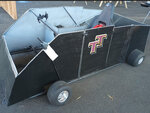
As someone who has always been interested in cars, when then-preteen Pedro Picazo’s cousin first showed him his hydrogen fuel cell-powered Toyota Mira about five years ago, Picazo immediately had him pop the hood.
“I was like, ‘how come there’s not more of this?’ That was like the first time that I saw it,” Picazo said of hydrogen cell-powered vehicles.
Picazo and his family soon moved from San Bernardino, California, to Lewis County, where Picazo started attending Centralia High School as a freshman in 2021. After seeing his fellow metal shop classmates take part in SkillsUSA competitions, Picazo decided to participate in SkillsUSA and FFA competitions his sophomore year.
Meanwhile, Picazo got into a discussion with his science teacher at the time, Kendra Meek, about renewable energy sources and the benefits of hydrogen, which led to him researching the topic more heavily.
Hydrogen has been a hot topic among political leaders in Lewis County and Washington state as a whole in recent years, no more so than on Friday when President Joe Biden announced federal grants up to $1 billion to create a hydrogen hub in the Pacific Northwest, with a plant eyed for Centralia.
Last year, Picazo happened to be talking to Meek during an FFA competition about an engine she had in the back of her class, and Picazo asked if he could have it to build a go-kart.
“She was like, ‘if you can make it work with hydrogen, you can have it.’ So I took on the task,” Picazo said.
Looking at the standard combustion engine he had to work with, Picazo said, “I was like, ‘the three things you need are air, fuel and spark for anything to work,’ so I had air and I would use hydrogen as a fuel, and obviously I had a spark, so I just replaced the fuel with hydrogen and started tweaking stuff with the carburetor. And from there, it just started running, and I was like — this is a groundbreaker,” he said.
Picazo outfitted the hydrogen engine into a go-kart he built from scratch and, via SkillsUSA, entered it into the Southwest Washington Fair and the Washington State Fair, where he placed first and second, respectively, in welding sculpture. Picazo also placed third in fabrication at the Southwest Washington Fair.
“Right now, it’s just sitting … It's sort of like a trophy, pretty much. Reminds me of where I started, because I want to do more,” Picazo said of the go-kart.
Now a junior at Centralia High School, Picazo said he's thinking about taking a short break from hydrogen-based projects.
“I want to do something like grab an engine out of a motorcycle or something, a small motor, throw it onto a go-kart and make that work,” he said.
He’s far from finished with hydrogen, however. He’s working with Twin Transit to possibly get a hydrogen fuel cell to use in building a street-legal vehicle, and is looking forward to the proposed opening of a local hydrogen fueling station so he can more-easily run tests.
Twin Transit and Centralia College announced the intent to build a hydrogen fuel station on Port of Chehalis property in Centralia in February of 2022. If built, according to previous reporting by The Chronicle, the facility would cost between $400 million and $600 million.
In a move that would support future projects like Picazo’s go-kart, Twin Transit, the Centralia School District and the Chehalis School District announced Friday they have collectively obtained $375,576 in funding to support the first phase of the Renewable Energy Vehicle and Infrastructure Technician (REVIT) training program: a concerted effort to develop statewide curriculum in grades 8-12 STEM programs that educates students on the health and environmental benefits of transforming diesel fleets to zero emission fleets, as well as overcoming the challenges of transitioning these fleets.
Students will participate in hands-on instruction with emerging technologies such as hydrogen fuel-cell vehicles, electric vehicle charging infrastructure, solar power systems, and wind turbines as preparation for jobs created by zero-emission transitioning of fleets and other clean energy technologies, according to a Twin Transit news release.